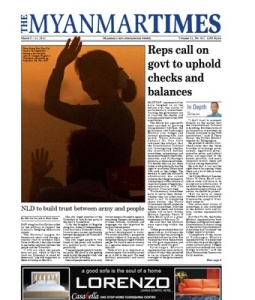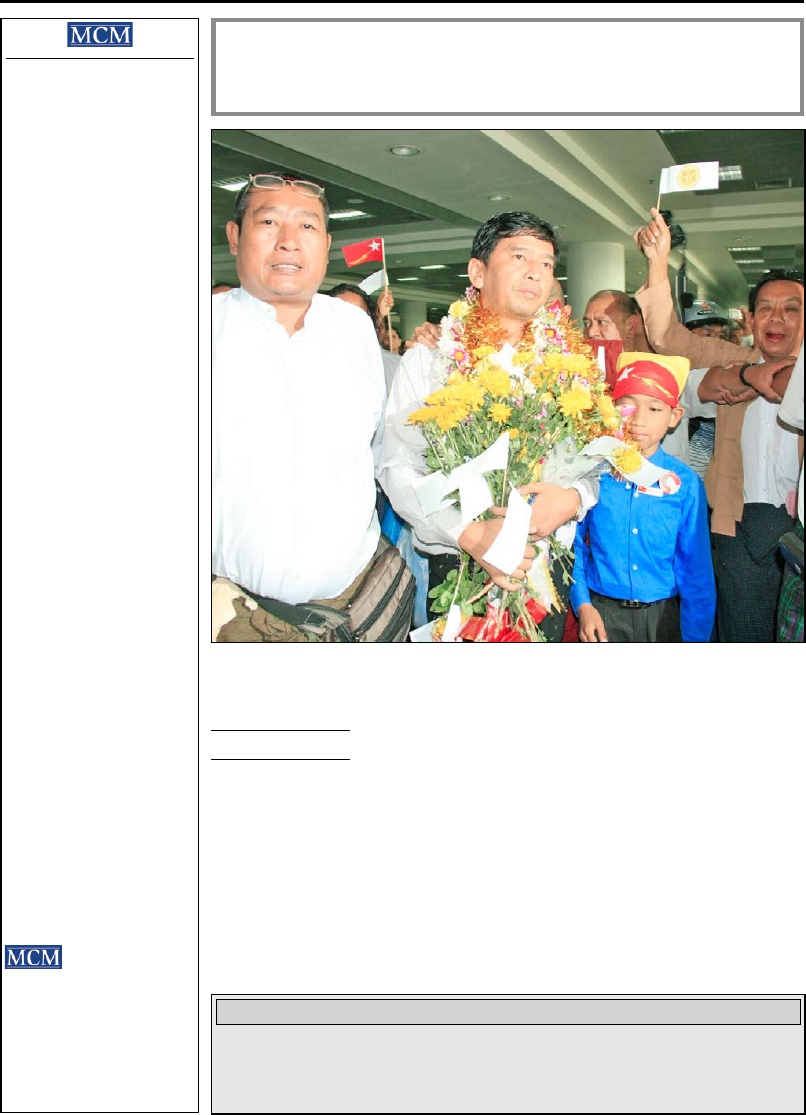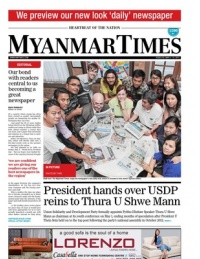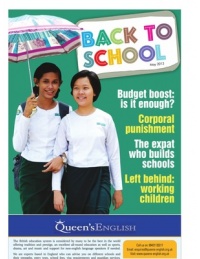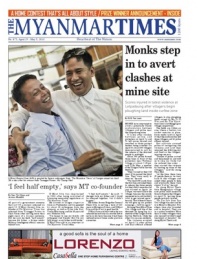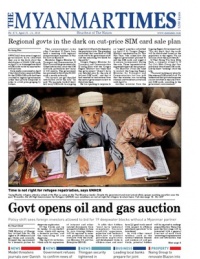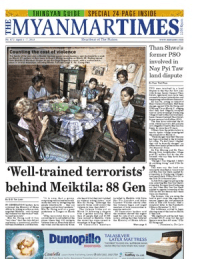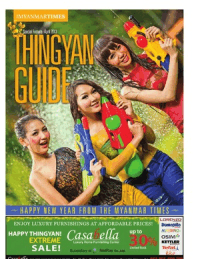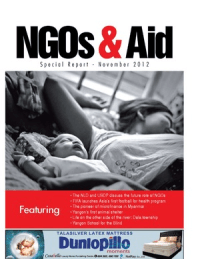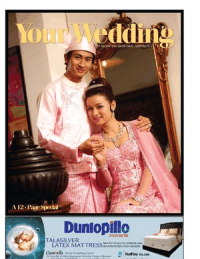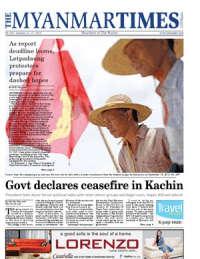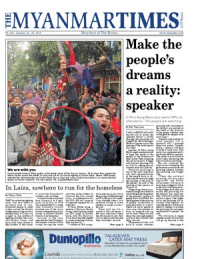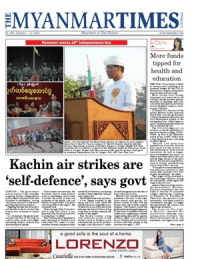myanmar
times
t H e
March 5 - 11, 2012
Myanmar’s first international weekly Volume 31, No. 617 1200 Kyats
NLD to build trust between army and people
HLUTTAW representativeshave weighed in on thedebate over the status of parliamentary committees,warning the government notto override the checks andbalances enshrined in the 2008constitution.The debate has apparentlybeen sparked by growingdisagreement between thegovernment and PyidaungsuHluttaw over budget andnational planning bills. Lastmonth, Union Attorney-General Dr Tun Shininformed the hluttaw thatthe Constitutional Tribunalwas investigating whetherthe constitution definescommittees, commissions andteams established by the Pyithu, Amyotha and Pyidaungsuhluttaws as Union-level bodies.If it decides they are not, thesebodies could potentially lose theright to scrutinise Union-levelbills such as the budget. Thedecision to seek the tribunal’sadjudication has raisedconcerns that the government isattempting to stifle criticism of important pieces of legislation,representative told
The Myanmar Times
last week.“Parliamentary committeeshave to serve their duties,whether they are called unionlevel or not. In completingthese duties, the UnionGovernment should cooperatewith our committees. If not thelegislative check and balancesystem will be lost,” PyithuHluttaw Speaker Thura UShwe Mann said at a pressconference on February 20.He said that the hluttawswere operating within thelaws.“If [the government] does notagree with us, it will mean thedemocracy that we are trying toestablish will not be alive. Butwe hope that from these eventswe will gain experience andeventually reach our goal.”Pyidaungsu Hluttawrepresentatives were similarlycritical of what they perceivedto be an attempt to reduceoversight of the government’sactivities.“I don’t want to commentdirectly on the matter thatthe Constitutional Tribunalis handling. But [the status of parliamentary committees is]already contained in the 2008constitution,” said U TheinNyunt, the Pyithu Hluttawmember for Thingangyun.He pointed to section 11(a),which states that the “threebranches of sovereign powernamely, legislative power,executive power and judicialpower are separated, to theextent possible, and exertreciprocal control, check andbalance among themselves”.He said that it was not theright time to be arguing “whenthere are a lot of reform tasksto be done”.“As Pyithu Hluttaw SpeakerThura U Shwe Mann said,reform tasks will have to becarried out in collaboration. If we follow the democratic way,we should accept criticism andadvice, we should be patient.“But we have to checkwhether criticism is reasonable.If reasonable, accept it. If not,don’t accept it.”The union-level status of committees is also confirmedin the hluttaw laws and by-laws, another representativesaid.Daw Nan Wa Nu, the PyithuHluttaw representative fromKunhein, said the move to seek aConstitutional Tribunal rulingon the status of parliamentarycommittees had “confused” thebudget approval process.“Irrespective of the statusof Pyidaungsu Hluttawrepresentatives, it is enshrinedin law that we have the right toassess national plans, budgetsand contract entered into withforeign countries,” said theShan Nationalities DemocraticParty member.
Reps call ongovt to upholdchecks andbalances
More page 4Daw Aung San Suu Kyiwaves to supportersduring a by-electionrally in Yangon Region’sThongwa township onFebruary 26.
Pic: AFP
By Win Ko Ko Latt in Shan State
DAW Aung San Suu Kyi has calledon the military to support thecountry’s fledgling democraticsystem.The National League forDemocracy chair said during aone-day visit to southern ShanState on March 1 that she wantedto see better relations between thepeople and the Tatmadaw.“I will say what the peopledare not say, which is that wewant our Tatmadaw to stand fordemocracy,” she told supporters inHeho township on March 1.She also urged members of theTatmadaw to vote for her party inthe April 1 by-elections.“I am the daughter of Bogyoke Aung San, father of independence.I was born into a Tatmadaw family.I want to see a warmer relationshipbetween the people and Tatmadawbased on trust.”She also urged people to votebased on the policy and traditionof a political party rather thanpersonality.“I request people openly to vote formy party. My party is also gettingready to obey the people’s wish,” shesaid in Kalaw township.She said people need to have unitybut not necessarily need to agree oneverything. Respect and recognitionof other cultures, traditions andlanguages was also important fornational development.“The basic requirement fornational development is unity.We cannot establish a prosperouscountry without it. Our party alsorecognises the equal rights of ethnicpeople. We want to see our countryas a genuine democratic union,”she said.“Rule of law is as important asinternal peace. Our country cannotgo as it did in the past. We needpolitical, economical and socialreform.”
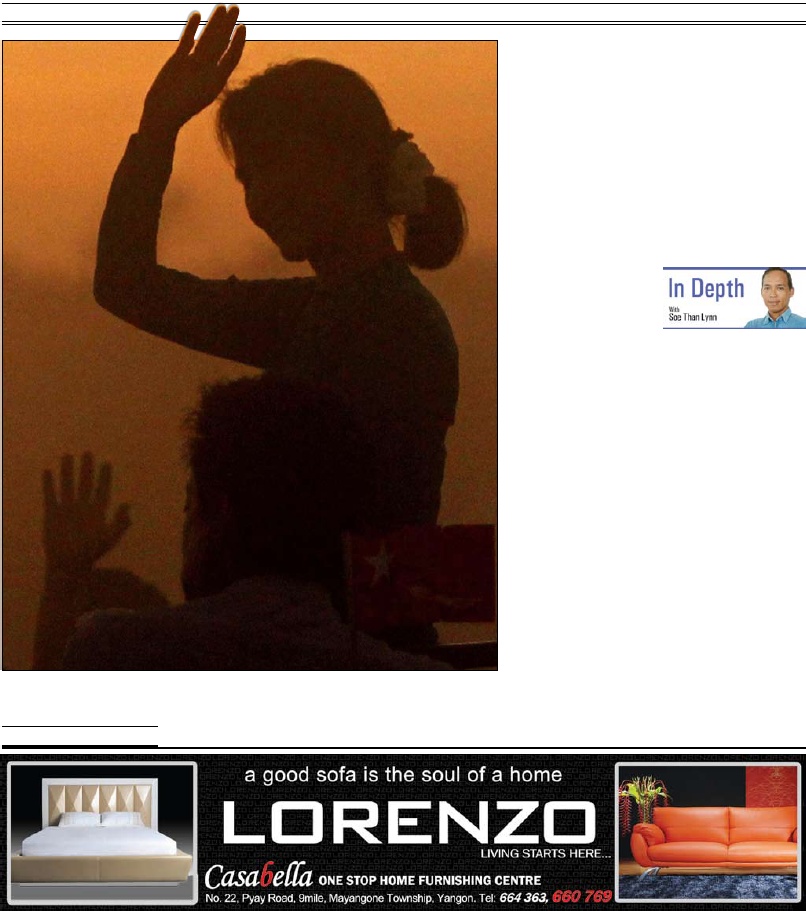

C
omment
the
M
yanMar
t
iMes
2
March 5 - 11, 2012
The Mail Box
Got something to say? We want to hear rom you. Address all correspondence to the Editor,
The Myanmar Times
(English). We endeavour to respond to all correspondencei n a timely manner.Address: 379-383, Bo Aung Kyaw Street, Kyauktada township, Yangon. Telephone: (+951) 392-928, 253-642, Fax: (+951) 392-706Email: your.myanmar.times@gmail.com
Dear Editor,It was encouraging and informative to readthe article by Myat Khaing in the latestedition of
Monitor News Journal
wherethe once strictly taboo subject of who wasresponsible for the mining, demolitionand destruction of the historic RangoonUniversity Students Union building onJuly 8, 1962 was discussed.This same article also referred toextracts in the
Northern Star Journal
by veteran politician Thakin Tin Mya onhappenings and experiences during theBurma Socialist Programme Party periodwhen the then-Chief of Staff General NeWin invited him and three others to his Ady Road residence on March 10, 1963 todiscuss the political situation and explainwhy he parted ways with Brigadier AungGyi, the then-Vice Chief of Staff (Army).There was also a separate but relevantstatement by Aung Gyi on his 93
rd
birthdaywhere, among other things, it was revealed– perhaps for the first time – that of thelegendary Thirty Comrades Bo Setkya, BoLetya and Bo Zeya were higher-rankingthan Bo Ne Win in both military rank andthe political structure. As we move to a more democratic systemwith many changes from the past fivedecades it is imperative that all insideand outside the country become moreaware of what really happened in Burma,particularly from 1962 to 1988.BBS U Win TinKamaryutDear Editor,On February 20 at the Pyithu Hluttawsession, the representative forThingangyun submitted a proposal toestablish a Union Commission on CounterCorruption to pave the way for cleangovernment and good governance.Having viewed this on MRTV andread it in
Myanma Ahlin
(New Lightof Myanmar) the next day I felt itwas a bold step to fill a crucial gapin developing democracy within adisciplined society.If the Union Commission on CounterCorruption is formed I hope not onlythe citizens of Myanmar but also theinternational society will welcome it andhave more confidence in the government,hluttaws and Myanmar democracy ingeneral.In this respect I recall a research paper–
Corruption: Causes, Consequences andCures
– by U Myint, the chief economicadviser to President U Thein Sein,published in the Vol 7, No 2 edition of the
Asia-Pacific Development Journal
inDecember 2000. This paper is a valuableand technically complete work in regardsto fighting corruption.It is easy to talk about tacklingthe corruption problem but harder toimplement an anti-corruption agenda. Ilook forward to seeing more focus in themedia as well as the broader society onthis topic.Perry Han Shin
By Adam McCarty
THERE are strikingparallels between theeconomy of Vietnam in the1990s and that of Myanmartoday. Of course there arealso many differences, butthe similarities suggestthat there are lessons forMyanmar as it opens itseconomy to the world,particularly given that Vietnam has averaged 7-8percent annual GDP growthfor the past two decades. A key question is whateconomic reforms shouldMyanmar focus on in 2012and during the immediatepost-sanctions period?There are similarities inthe “starting point” of bothcountries. In 1992, Vietnamimplemented its firstsystematic measurement of living standards and reporteda poverty rate of nearlyone-in-two Vietnamese. A similar survey in Myanmarin 2005 reported one-in-three in poverty. Vietnam 20years ago was less developedand poorer than Myanmartoday, yet both “start” aspoor countries with greatpotential – notably a young,large and literate population– with that potential notbeing fully realised forboth external (sanctions)and internal reasons(protectionist policies, aweak legal system andproperty rights, and so on).Even policy changesshow similarities. In 1989 Vietnam unified its officialand black market exchangerates, just as Myanmar isin the process of doing. The American-led trade andinvestment embargo against Vietnam dragged on until1993 (one year after a newconstitution in Vietnam),but hopefully, given thepresent pace of positivechanges, we might see theembargo against Myanmarlifted this year.In Vietnam, a series of important policy reformswere taken well before theembargo was lifted. Theseincluded the return of land toindividual farm householdson permanent use-rightbasis (1988); stabilisation of the macro-economy, notablyinflation (1989); removingbarriers that stoppedhouseholds from conductingbusinesses (1990 Law onPrivate Enterprises); andtrade and foreign investmentliberalisation (the 1987 Lawon FDI had no real impactuntil the exchange rateunification).The above four reformareas are, I argue, thefoundation for success inthe post-embargo periodin Vietnam. All were builtupon in later years, suchas the 1993 amended LandLaw that made agriculturalland-use rights transferableand useable as collateral,and the 2000 EnterpriseLaw.I choose the above fourreforms because openingup to world trade andinvestment (and officialdevelopment assistance,or ODA) is the only pathfor a country to get rich.Macroeconomic stability isa prerequisite for followingthat path: instability andhigh inflation, for example,lead to low foreign directinvestment (FDI). Yet if youwant equitable development– where more than anelite benefit – that rapidgrowth must be built onsupporting households. Mostimportantly, that meansgiving households privateownership of their assets,a legal framework thatprotects that ownership, anda minimum of regulationsand taxes on their ability todo business. In other words,encourage households toinvest, make profits andkeep them.Myanmar has much workto match the policy reformsof Vietnam over the pasttwo decades. Vietnam didnot wait for the embargoto be lifted before makingbold policy reforms andneither should Myanmar.This raises questions aboutthe appropriate sequencingof reforms: it is easy tomake lists of all the changesneeded, but in what ordershould they – and can they– be tackled?“Reform”, moreover, isnot just a matter of issuing(and removing) laws andregulations but also of building the institutionsthat make such papermeaningful: a CentralBank; Auditor General;Government Inspectorate;commercial and arbitrationcourts; judiciary; professionalassociations; researchinstitutes and universities;and many more. Another “lesson” from Vietnam is that “reform”is a continuous processof issuing, reviewing,amending and removingpolicies – and one thatrequires much effort andgovernment capacity. Inthe 1980s, the Vietnamesegovernment structure wastop-heavy and cumbersome.Many small matters couldonly be decided at the highestlevels. That was fine whennot much was changing –for example, when therewere few foreign investors– but during the 1990s itwas clearly a bottleneckto progress. Since then, aprocess of decentralistionand administrative reformhas tried to keep pace withthe demands of a modernand competitive marketeconomy. The governmentof Myanmar will face thesame challenge; the fasterit can decentralise authorityacross the board, the faster itcan benefit its own people. Vietnam has mademistakes as well and thereare negative lessons tolearn. Establishing state-owned product-specificmonopoly corporations wasa very different approachto Japan and South Korea,where private corporationswere encouraged to competeagainst each other for exportmarkets. Vietnam has alsonot handed over macro-economic policy managementto technical experts, such asa truly independent centralbank, so great confusionpersists about appropriatepolicy instruments andtargets. Further, Vietnamhas been slow to liberaliseand make competitive itsfinancial sector. Yet thesenegatives are outweighed bythe positives that enabled Vietnam to achieve middle-income country status in2011 with a reported povertyrate of 12pc in 2009.In subsequent articlesin this series I will chooseparticular aspects of the Vietnamese reformexperience, explain them, andrelate them to contemporaryMyanmar. I have chosentopics of importance,but also of relevance todonor organisations, whowill be planning manynew “interventions” –read projects – with thegovernment this year. Thesetopics include microfinance,integrated ruraldevelopment, promotingprivate sector development,and trade liberalisation.Myanmar has a broad andcomprehensive policy reformagenda ahead of it, yet it isneither alone nor unique.The experience of othercountries, like Vietnam, cangive guidance – both goodand bad.(
Dr Adam McCarty isan Australian economistwho has been living andworking in Vietnam since1991 as a universitylecturer and consultant,conducting policy researchand project evaluations fordonor agencies. In 2001,he established Mekong Economics Ltd, where he ischief economist, and his worka across the Mekong regionhas covered microfinance, state enterprise reform,rural development impact evaluations, trade policy,aid effectiveness, and the education sector.
)
Vietnam: Two decades of development lessons
A bank employee countsVietnamese dong notesat a branch in Hanoi inNovember 2009.
Pic: AFP
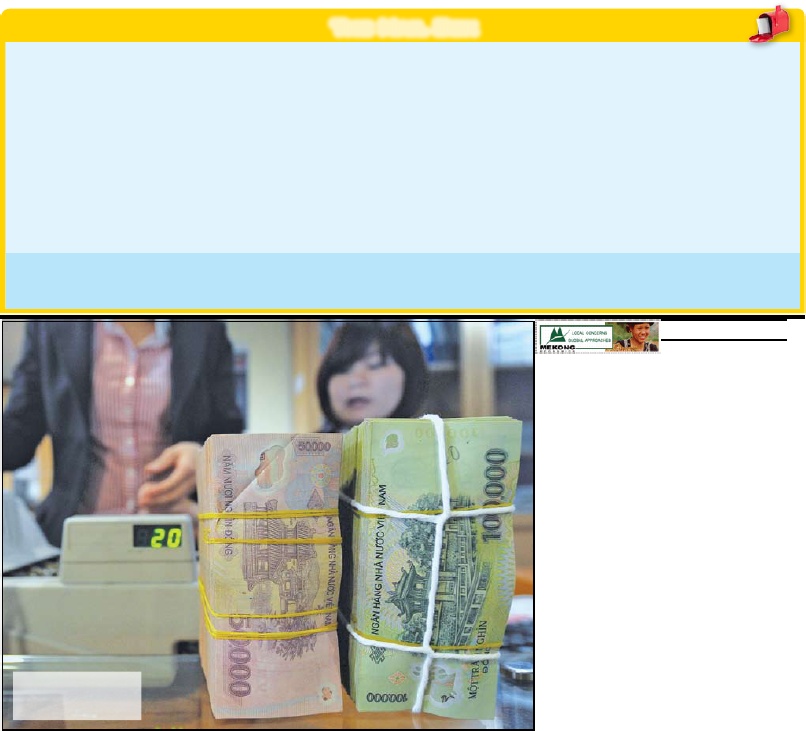




n
ews
3
the
M
yanMar
t
iMes
March 5 - 11, 2012
THE Ministry of Health is aiming toinoculate about 6.4 million children agednine months to five years as part of a massmeasles immunisation campaign, an officialsaid last week.Dr Aye Ko, health director of theDepartment of Health for Yangon Region,said at a measles campaign advisory meetingon February 28 that the national campaignwould target all children, regardless of theirvaccination history.The campaign will take place from March22 to 31 and is the first since 2007. It willbe conducted by the Ministry of Health withfunding from the United Nations Children’sFund and the World Health Organisationand assistance from American Red Crossand the UN Foundation.Dr Aye Ko said the national campaign wasimportant for those who might normally missout on vaccination, such as children in remoteareas. “The vaccination campaign is conductedbecause the measles cases were detected againin Myanmar during 2011,” he said, addingthat there were 1774 confirmed cases of measles last year.
– Yamon Phu Thit
By Shwe Yinn Mar Oo
NEWLY establishedMyanmar National Congresswill field three candidates inthe April 1 by-elections, itschairman said last week.U Kaung Myint Htut,who ran as an independentcandidate in November 2010,losing to former Yangonmayor U Aung Thein Linnin South Okkalapa, willcontest the Pyithu Hluttawseat of Mingalar TaungNyunt against candidatesfrom the National Leaguefor Democracy, DemocraticParty (Myanmar), UnionSolidarity and DevelopmentParty and National UnityParty.The party is also fieldingcandidates in Mayangoneand Dagon Seikkan, UKaung Myint Htut said at aceremony to open the party’shead office, in MingalarTaung Nyunt township, onFebruary 26.“The candidates havealready started campaigningbut we want to make publicmeeting. This is not only forattracting votes, but also toraise the people’s awarenessabout politics,” he said.
By Kyaw Hsu Mon andTin Hlaing
THE National League forDemocracy has initiatedlegal proceedings againsta former member who isrunning against the partyin Meiktila township.NLD spokespersonU Nyan Win told
The Myanmar Times
onFebruary 29 that theparty’s Meiktila townshipchairman had filed the suitagainst Daw Myint Myint Aye, alleging that she usedthe party’s name whilecampaigning to misleadvoters.Daw Myint Myint Aye,54, joined the NLD in 1989but quit the party after itselected a candidate from Yangon, U Win Htein, tocontest the Pyithu Hluttawseat of Meiktila.In his submission to thetownship court on February22, NLD chairman forMeiktila Dr Thein Lwinalleged that Daw MyintMyint Aye’s campaignmanager, U Thein Aung,told residents she wasstill a member of the NLDduring a campaign trip.It was not immediatelyclear which regulationDaw Myint Myint Aye hadallegedly violated.“The case has reachedthe township court. DrThein Lwin and U WinHtein are solving it now,”U Nyan Win said.In a recent interviewDaw Myint Myint Ayesaid she would make clearto voters that she was nolonger associated with theNLD during her campaigntrips.Speaking to
The Myanmar Times
last week,she said her campaignmanager had accidentallyused an NLD letterheadwhen writing to a residentin Meiktila. Most of herclose supporters are formerNLD members.“I didn’t have anyintention to do it; mymanager accidentally usedthe cover letter of the NLDwhile writing a letter to aresident. My manager, UThein Aung, is a formerNLD member and I believehe didn’t mean to do it,”she said.Daw Myint Myint Ayesaid the police were stillmaking enquiries and wereyet to lay any charges.“I started my campaign12 days ago and I’ve beento more than 20 villages.Each time I told them I amnot a member of the NLDand I explained how I wascommitted to helping themin the future,” she said.Daw Myint Myint Ayesaid she did not knowwhich law or regulation hadallegedly been broken.“I will face this problem.I have a strong belief thatthis was not intentional.”
NLD fileslegal suitagainstrival inMeiktila
Govt readies for measles campaign
New Yangon partyopens headquarters
By Zaw Win Than andThomas Kean
TRAVELLING in Myanmaris about to get more expensive,with domestic airlines tointroduce a fuel surchargethis week that will see mostticket prices rise about 20percent.The rise comes after theMinistry of Energy announcedon February 28 that it wouldsell aviation fuel at themarket rate from March 1.It was not immediately clearwhat effect this would haveon the overall fuel price. Airlines immediatelyannounced fares would risefrom March 1 as a result butpushed back the increase oneweek following a backlashfrom agents and customers.The airlines said thesurcharge would dependon the destination, withincreases ranging from K7000to K18,000 for Myanmartravellers and US$10 to $25for foreign visitors, with thelargest increase on routesfrom Yangon to Myitkyina,Putao, Bhamo, Lashio, Kalayand Kawthoung. Agents expressed concernlast week that the suddenchange could harm the imageof the country’s tourismindustry, as they wouldhave to renegotiate priceswith customers and externalagents.“Nowadays many touristsare visiting Myanmar andI am worried [the increase]will negatively impacton tourist arrivals,” saida representative from a Yangon-based tour company.“We don’t know why theministry changed this policy.They should inform theairlines a bit earlier. Nowmany passengers are reallynot happy to pay the extracost.”Ma Eainsie Phyu fromNew Age Travellers said theimposition of the surchargewas premature and wouldcause “a lot of inconveniences”for agents and their clients.“The fuel price will notbe fixed anymore but nochanges have been made yet.But the airlines just took theopportunity [to raise prices].We can understand if thefuel price changes we have topay accordingly but the fuelprice has not yet officiallychanged,” she said.“We’ll unfortunately haveto request our clients topay the surcharge directlyto the airline when theycheck-in, although it willbe problematic for both ourcompany and our clients.”She said Myanmar was anincreasingly expensive traveldestination, particularlyrelative to its neighbours,with some hotels in Yangonrecently raising room ratesby as much as 40 percent.“Myanmar tourism won’tthrive in this region if thesekinds of things happenregularly. We shouldremember that we are notalone. Travellers have tonnesof destinations to choosefrom.”Customers who havealready issued tickets fortravel from March 8 will berequired to pay the surchargewhen checking in.But U Myat Thu, anassistant general managerfrom Air KBZ, said hiscompany would not levythe surcharge on ticketsfor travel before March 15that were purchased beforeMarch 2.“Those who buy a ticketwith us from March 3 [fortravel from March 8] willhave to pay for the increasedfuel surcharge,” he said.
Domestic airfares torise from March 8
Fuel surcharge rise
How muchextra will itcost you?
MyitkyinaYangonMandalayHehoNyaung ULashioTachileikSittweThandweDaweiKawthoungNay Pyi Taw
$25 / K18,000$15 / K12,000$10 / K7000
Fuel surcharge increase tocome into efect on all pri-vate domestic airlines romMarch 8 ollowing surpriseMinistry o Energy decisionto sell jet uel at marketprices rom March 1
Source: Air Bagan
Merlin Myanmar INGO would like to invite closed tender bids asper below the requirements, terms and conditions:1) Two saloon cars for usage in Yangon with occasional travel toNay Pyi Taw and Pathein areas.2) Two Four Wheel Drives (4WD) for usage in Yangon withoccasional travel to Laputta and Nay Pyi Taw areas. All major maintenances and repair costs will be the owners'responsibility. This rental contract will only be for vehicles; driverswill be hired by Merlin. Vehicle insurance will be covered by Merlin.Contracts will be of six month's duration Rental payment will bepaid on a monthly basis. Any interested parties/owners/agent/service companies are invitedto submit closed tenders to the contact address below within onemonth after publication of this notice.Bids in sealed envelopes, titled “Closed Tender Bid for Vehicles”,should be delivered to Merlin No.224(A), 4th Floor, SalomonBuilding, U Wisaya Rd, Bahan T/S.
Tender Invitation For Vehicle Rental
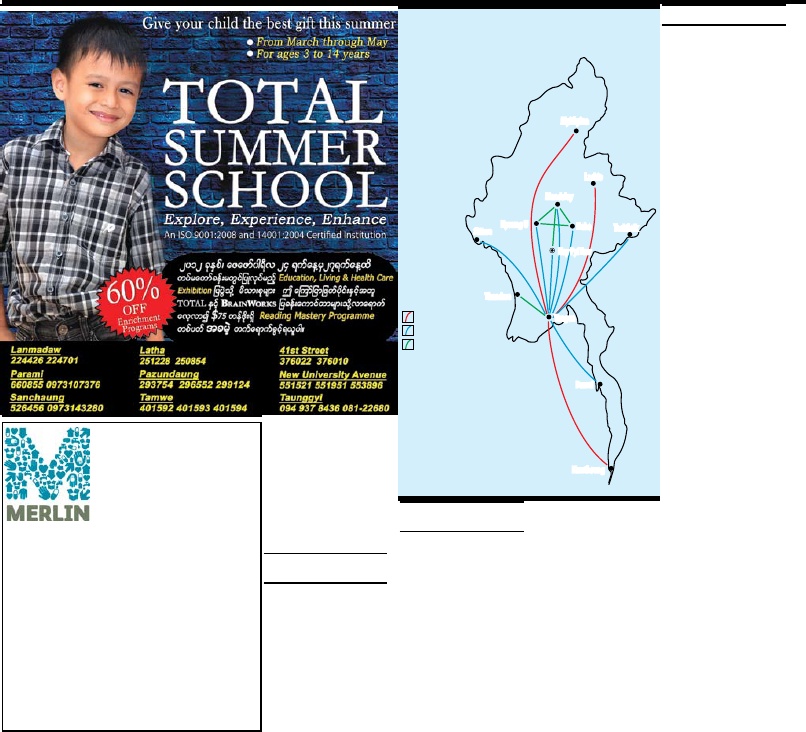





検索履歴:
結果00中00
00結果次の結果
p.
Notes
Post Note
